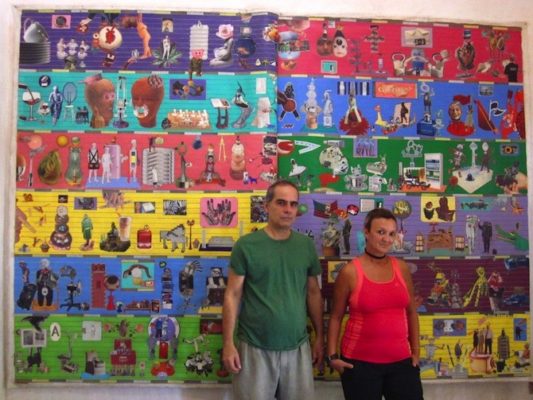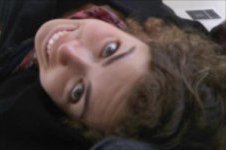Search
To search for an exact match, type the word or phrase you want in quotation marks.
A*DESK has been offering since 2002 contents about criticism and contemporary art. A*DESK has become consolidated thanks to all those who have believed in the project, all those who have followed us, debating, participating and collaborating. Many people have collaborated with A*DESK, and continue to do so. Their efforts, knowledge and belief in the project are what make it grow internationally. At A*DESK we have also generated work for over one hundred professionals in culture, from small collaborations with reviews and classes, to more prolonged and intense collaborations.
At A*DESK we believe in the need for free and universal access to culture and knowledge. We want to carry on being independent, remaining open to more ideas and opinions. If you believe in A*DESK, we need your backing to be able to continue. You can now participate in the project by supporting it. You can choose how much you want to contribute to the project.
You can decide how much you want to bring to the project.

Clearly engaged, folkloric, colourful, Creole … are labels that are often expected of Cuban art, and they are labels that it often uses because expectations satisfied are generally bought. There are artists and other agents in the cultural arena of Cuba who’ve had enough of these labels and the Museo de Arte Maníaco (MAM) is one example. The MAM, an acronym the phonetics of which are reminiscent,in a sort of parody, of MoMA, aims to do precisely that: “to rupture the structure that a museum must have”, according to its founder, Sandra Ceballos.
It’s a museum that wants to be approachable, with room for artists of all generations, Cuban and non-Cuban, recognised and outsider, alive and dead. These very premises coincide with those of Espacio Aglutinador, according to the space, the first independent space for contemporary art in Cuba since 59, also directed by S. Ceballos. Now, the creation of MAM proposes to bring to the light of day the collection that the Espacio Aglutinador has been gestating, as well as proposals made specifically for MAM or others already in existence, through shows travelling to artists’ houses and other places peripheral to this type of proposal, such as the Cuban countryside.
The third exhibition of the MAM, and the first outside the Espacio Aglutinador, “Mentes, 1ra fase”, was inaugurated on the 14 September in “Línea 106”, the house of the artists Alfredo Ramos and Katarzyna Badach, where since 2008 two other exhibitions had previously been organised. Fernando Ruíz, Vladimir Llaguno, Ermy Taño Carrillo and the host artists are participating in the exhibition.
The work of these five artists where one can see photography, painting, painting and text, video, sculpture and collage, coincide in one point: they all shrink from a definition of the individual reduced to a political mega-discourse that goes beyond them. Rather, they stem from an individual conditioned by his mental state; a mental state that can have more points in common with people who live in different points of the planet than with those who live on the same island. As the manifesto of MAM says, “[…] we consider maniac art all works that have been made by any artist, be they a graduate from an art school or not, who finds themselves under psychological pressure (from those presenting slight psycho-pathologies to those with severe mental deficiencies; as well as artists with severe addictions to different narcotics and toxic substances that have lacerated and modified their self-esteem and conduct, thereby distorting their perception of the id and the medium in which they live) and who express it unashamedly.”
In “Mentes, 1ra fase” this psychological pressure is sometimes more appreciable in the object of the artist than in the actual artist. K. Badach presents the video of watercolours “The Gardens of Stuttgarterstr”, from 2003-2007. It describes the allotments of Stuttgarterstrasse in Karlsruhe, Germany. These constitute a space where, above all, Germans of foreign origin grow things and live according to their own rules, where they can self-represent themselves in a free manner through a compendium of distinctive elements. The continuity of this space has been under threat for a while now from the local government of Karlsruhe.
The MAM aims to legitimate the Other. To be able to legitimate implies displaying a certain kind of power. Isn’t this falling into the trap of Power? Creating another base structure where whatever isn’t the Other is condemned to having to resist? No. The MAM facilitates a space for otherness fully aware that today this otherness will continue to be other, so the positions have still not been inverted. It’s not falling into the trap of Power, it’s a fight.

Raquel Machtus is a nomad by birth. Aside from her enthusiasm for discovering new places in the world, she is also interested in nomadism in situ, that is to say exploring and going deeper into the as yet not established connections between elements within a context. In addition, she thinks that art, analysed through all its facets, offers very interesting perspectives on this nomadism. She’s proposing to go into them in more depth.
"A desk is a dangerous place from which to watch the world" (John Le Carré)